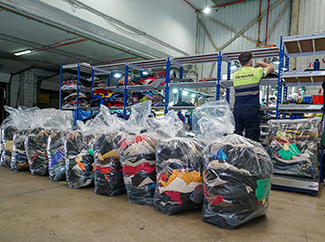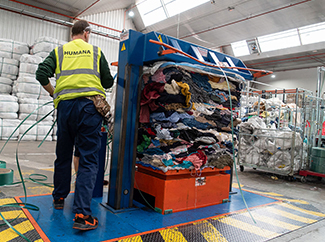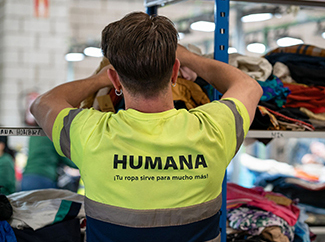consent_cookie
Duración: 1 year
Stores the user's cookie consent state
20-08-2025
The Ministry for the Ecological Transition and the Demographic Challenge (MITECO) has drafted a Royal Decree regulating the management of textile waste that “creates regulatory inconsistencies, is disconnected from the sector’s operational reality, and increases existing legal uncertainty.” This is the concern expressed by Humana, a pioneering organization in the sector with 38 years of experience, regarding a text aimed at regulating a complex industry.
Humana emphasizes that this draft, open to public comment until September 4, “far from clarifying the regulatory framework, raises more questions than answers, introduces confusing concepts, and grants excessive power to producers without ensuring transparency or effective oversight of their decisions,” according to Rafael Mas, Director of Projects and External Relations at the organization.
The management of used textiles is at a critical juncture. Law 7/2022 of April 8, on Waste and Contaminated Soils for a Circular Economy, introduces two major developments this year: first, the mandatory separate collection of textile waste in all EU municipalities (in effect since January 1); and second, the creation of the Extended Producer Responsibility (EPR) scheme, which requires producers (manufacturers and importers) to take responsibility for the entire life cycle of their products and support the sustainable management of textile waste.
As with packaging or electrical appliances, textile producers must contribute financially for each garment placed on the market to cover the costs of separate collection. In principle, this EPR should have been in force since last April; however, MITECO is still debating how it will be implemented.
In this context, the ministry has drafted a Royal Decree on textile waste management, outlining the responsibilities of the EPR and defining other key aspects for the sector.
Extreme Concern
“We are deeply concerned about the discretionary power granted to the Extended Producer Responsibility (EPR) system, which will gain strategic control over a market that is already functioning,” warns Rafael Mas, Director of Projects and External Relations at the organization. He adds: “The ministry’s proposed draft lacks mechanisms for control and transparency over the EPR’s actions, leaving key decisions—such as contracting, selection criteria, and the final destination of waste—in its hands, without guarantees of public oversight.” “The result will be an unbalanced model, significantly more expensive, less efficient, and even far removed from sound environmental practices,” he states.
Currently, textile waste management is a municipal responsibility and is carried out by authorized operators in accordance with Law 7/2022. However, the Royal Decree proposal undermines this structure by introducing a previously nonexistent figure: the ‘reuse operator’. “We oppose this new figure, which is not legally established. It lacks technical definition or public oversight and threatens to undermine the system’s rigor and enable practices without traceability. Only authorized operators should manage textile waste, and it should only be processed in licensed sorting facilities,” says Rafael Mas.
Waste Prevention
The draft is notably unambitious in terms of waste prevention and reduction, and fails to mention global reuse as a valid approach within the hierarchical treatment of textile waste. “Ignoring international reuse—which is currently the only viable option at scale—directly contradicts the EU waste hierarchy, which mandates prioritizing reuse over recycling and other forms of treatment,” emphasizes the Humana representative.
Additionally, the draft Royal Decree on textile waste management introduces a redundant and belated definition of social economy entities, despite their inclusion in Law 5/2011 on the Social Economy. “Far from providing clarity, this regulatory maneuver seems to serve a compensatory purpose, which does not remotely address the structural imbalances created by Law 7/2022. These terminological interventions do not solve the core issue. Entities managing waste, regardless of their type, must be subject to the same legal framework—without privileges or shortcuts,” Mas stresses.
“The result is an asymmetric regulatory model that penalizes operators like Humana, which has been working seriously for nearly four decades with environmental criteria and a social mission, while opening the door to less demanding practices under the guise of the social economy,” he concludes. “A system is being built that disregards the experience of existing actors, destabilizes what already works in the market, and undermines the fundamental principles of waste management in Spain.”
Humana urges MITECO to thoroughly review the draft, strengthening its legal coherence, environmental ambition, and commitment to the circular economy, and avoiding the creation of a system that favors private interests over the public good.


